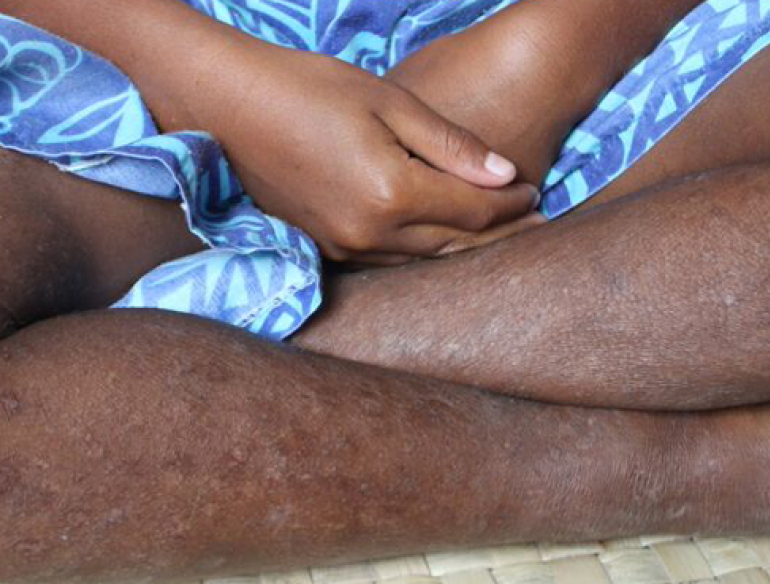In a world-first study, treatment of a whole community with ivermectin has been shown to virtually eliminate scabies, reducing prevalence by 94 per cent and providing new hope in the fight to control this debilitating disease.
The study was conducted in Fiji by the Murdoch Childrens Research Institute, the Kirby Institute at UNSW Australia and the Fiji Ministry of Health and published in the New England Journal of Medicine.
Scabies is a skin disease caused by a microscopic mite which affects over 100 million people globally, particularly children in disadvantaged countries. It causes extreme itchiness affecting sleep, work and study, and the broken skin can lead to serious bacterial infection and cause potentially deadly diseases including rheumatic fever, rheumatic heart disease and chronic renal failure.
In the Pacific Islands, including Fiji, scabies is one of the most serious health problems affecting communities, with one quarter of the population infected. While the current guideline-recommended treatment of permethrin cream effectively treats individual patients there are so many cases in the community that people often become reinfected.
Researchers from the Skin Health Intervention Fiji Trial (SHIFT) looked at whether treating all residents of an isolated island community was more effective at controlling scabies and skin sores than individual treatment with permethrin cream to infected patients. The researchers also investigated whether mass administration of ivermectin tablets or permethrin cream was more effective.
Senior researcher, A/Professor Andrew Steer of the Murdoch Childrens Research Institute, says that as one of the most neglected tropical diseases, scabies is an under-recognized cause of illness and economic burden in many developing countries.
“We need to find a safe, effective means of controlling scabies and skin sores in these countries because the terrible itching leads to infection of the skin by bacteria that can cause potentially deadly diseases of the kidneys, heart and bloodstream.”
The researchers assigned three island communities to different interventions for scabies control: standard care involving treatment of affected individuals and their families using permethrin cream, mass administration of permethrin cream, and mass administration of ivermectin tablets.
After one year the prevalence of scabies declined in all groups, but by far the most dramatic reduction was in the ivermectin group with a fall in prevalence of 94 per cent. In the permethrin group prevalence declined by 62 per cent, and in the standard-care group by 49 per cent.
The prevalence of skin sores also declined by an impressive 67 per cent in the ivermectin group.
The Fijian Director of Public Health, Dr Eric Rafai, says: “The mass administration of ivermectin has been an astounding success, and we hope it will alleviate the blight of scabies and skin sores in the future.”
The 2015 Nobel Prize for Medicine was recently awarded to the scientists who discovered ivermectin. Over 2 billion doses of the medication have been delivered as part of mass drug administration programmes for the control of river blindness and lymphatic filariasis.
Co-researcher, Professor John Kaldor from The Kirby Institute says “Ivermectin has been a quiet achiever for many years, helping to eliminate devastating parasitic diseases in many developing countries, but its potentially game-changing role in scabies control has not been clear until now. This study is a huge step forward in reducing the impact of this insidious disease.”
Written by Anna Curran, Murdoch Childrens Research Institute
Contact
Laurie Legere
Phone
+61 (2) 9385 9987
